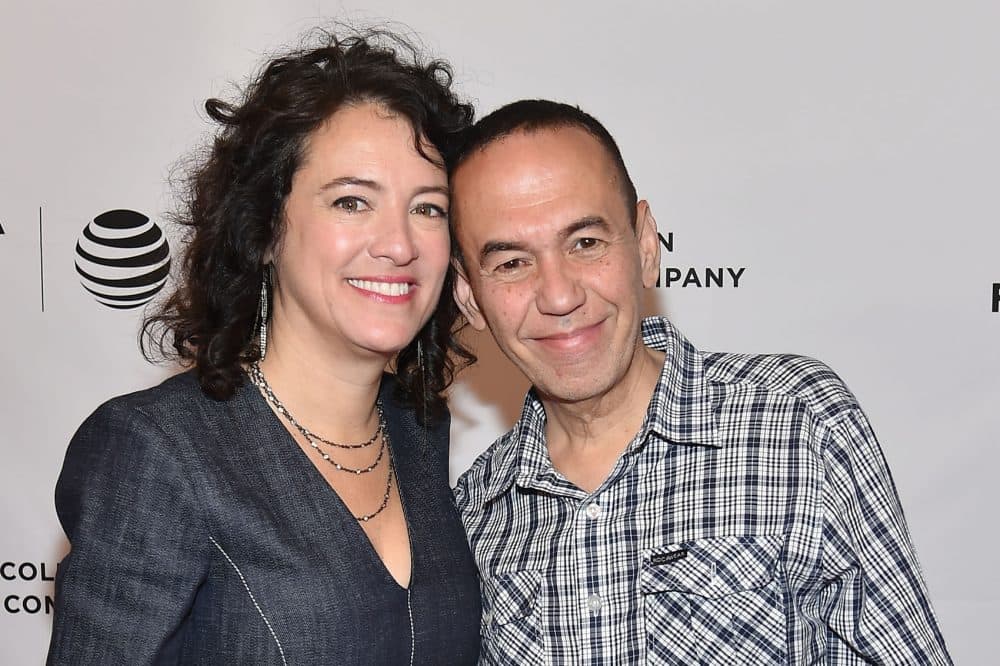Advertisement
Humor In The Holocaust? Documentary Explores Where Comedy Draws The Line

Is it possible to make jokes about a topic as devastating as the Holocaust? The new documentary "The Last Laugh" looks at that question by talking to Holocaust survivors, writers and comedians.
Here & Now's Jeremy Hobson talks with director Ferne Pearlstein and comedian Gilbert Gottfried (@RealGilbert), who appears in the film.
Interview Highlights
On why the film was made
Pearlstein: "I wanted to make the film because a friend presented this idea to me many years ago in 1993, and it was just something that I really wanted to make but I knew I couldn't make right away. Then years later I saw Gilbert in 'The Aristocrats,' and I said, 'He's making 9/11 jokes and people are laughing, people are ready for my film.' So from 1993 till 2006, he truly inspired the start of it."
Gottfried, on why he participated
Gottfried: "It was something that just seemed like a good fit because I am constantly getting in trouble for stuff I joke about and people are always accusing me of like, 'Oh, you can't joke about this topic or that topic,' or, 'It's too soon, you have to wait this amount of time and that makes it OK.' So I was ready to talk about it... I think it's silly that such a big uproar can happen over a joke. I remember when I got in trouble with the whole tsunami business, they were writing it up as, 'Gilbert Gottfried's tasteless comments and remarks,' and none of them were calling them jokes, because when you say 'joke,' the word 'joke' you think, 'Yeah, he's a comedian, he makes jokes.' ['Tasteless comments'] makes it sound like I'm really making a statement, like bad things that happen I'm in favor of."
"The thing that made me want to make this film was when I found out that there was some humor in the camps. That in that darkest of dark, people could still find humor there."
Ferne Pearlstein
On where the line is for joking about the Holocaust
Gottfried: "It's a funny thing, I'm as hypocritical as anybody, because when there was the big uproar about Mel Gibson, they said, 'Mel Gibson was driving drunk and they arrested him and he asks the policewoman if she was a Jew and she said 'yes' and he said 'you Jews caused all the wars in the world,' and then he called her some obscene sexual remark, and news came out that he slapped his wife while she was holding their child and he said to his wife he wants a group of African Americans, although he didn't use that term, to rape her, and he would hit her over the head with a shovel and bury her in the rose garden. And when all that was said and done, all I could think was, 'Wait a minute, what did he say about the Jews?'"
On the decision to include Holocaust survivors like Renee Firestone in the film
Pearlstein: "The thing that made me want to make this film was when I found out that there was some humor in the camps. That in that darkest of dark, people could still find humor there. I wanted that personal story, I also wanted to see it through [Firestone's] eyes. In the film you see her looking at comedians through doing their stuff on YouTube, some Holocaust jokes, and I wanted that feeling of, 'Well you know its not a black-and-white issue, is it OK? Not OK?' Well it depends, you know? There's time, context, who's your audience? Who's the person making the joke? There's so many factors, and I know, for instance, when she's watching Sarah Silverman do stuff from 'Jesus Is Magic,' which is a show I saw in the earliest of days in a little black-box theater with a lot of people my age watching it in the dark where you're not being held accountable, it was hilarious. But then when I was filming her and the camera is on her face, hearing those same lines delivered, it was uncomfortable, it was different... Just because [Firestone] has a great sense of humor and a great spirit and chooses to laugh than to cry, she still may not find it funny when Sarah Silverman tells a joke about her grandmother having the tattoo from the camps say 'bedazzled' instead of numbers. But she often says, 'I don't think it's funny, I'm not offended.'"
Advertisement
On how other Jewish comedians feel
Pearlstein: "For people like Mel Brooks, you can joke about the perpetrators but not the victims... I started every interview with the same set of questions and then I'd individually research that person and add a whole bunch of personal stuff to it. But every interview I started with, 'Do you have a Holocaust joke?' Because I wanted to sort of break the ice, and I started to notice this pattern that like after the fifth interview, I noticed that everyone would say, 'Well I don't have a Holocaust joke, but I do have a Nazi joke.'"
This segment aired on March 2, 2017.
